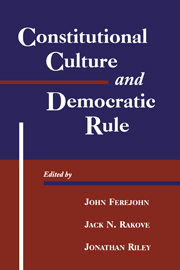Book contents
- Frontmatter
- Contents
- List of Contributors
- Editors' Introduction
- PART ONE CONSTITUTIONAL BEGINNINGS AND TRANSITIONS
- PART TWO CONSTITUTIONAL STRUCTURE AND DESIGN
- 4 Constitutional Democracy as a Two-Stage Game
- 5 Imagining Another Madisonian Republic
- 6 One and Three: Separation of Powers and the Independence of the Judiciary in the Italian Constitution
- 7 A Political Theory of Federalism
- PART THREE CONSTITUTIONAL CHANGE AND STABILITY
- Name Index
- Subject Index
5 - Imagining Another Madisonian Republic
Published online by Cambridge University Press: 20 March 2010
- Frontmatter
- Contents
- List of Contributors
- Editors' Introduction
- PART ONE CONSTITUTIONAL BEGINNINGS AND TRANSITIONS
- PART TWO CONSTITUTIONAL STRUCTURE AND DESIGN
- 4 Constitutional Democracy as a Two-Stage Game
- 5 Imagining Another Madisonian Republic
- 6 One and Three: Separation of Powers and the Independence of the Judiciary in the Italian Constitution
- 7 A Political Theory of Federalism
- PART THREE CONSTITUTIONAL CHANGE AND STABILITY
- Name Index
- Subject Index
Summary
INTRODUCTION: WHO SHOULD CONTROL CONSTITUTIONAL INTERPRETATION?
Madison, in a letter sent to John Brown during October 1788 discussing Jefferson's 1783 draft of a constitution for Virginia, pointed to a flaw in the U.S. Constitution, which has never been remedied by formal amendment: “In the State Constitutions & indeed in the Federal one also, no provision is made for the case of a disagreement in expounding them” (Meyers 1981, 42). Writing as Publius in The Federalist some eight months earlier, he had noted that the legislature is supposed to be supreme in a constitutional democracy: “In republican government the legislative authority, necessarily, predominates” (Federalist 51, 350). But the flawed design of American constitutions allowed the judiciary to claim supremacy over the legislature: “[A]s the Courts are generally the last in making the decision it results to them by refusing or not refusing to execute a law, to stamp it with its final character. This makes the Judiciary Department paramount in fact to the Legislature, which was never intended and can never be proper” (Meyers 1981, 42–3). Madison thus seems opposed in principle to one of the most salient features of American constitutionalism as it has evolved, namely, the doctrine of judicial supremacy, which (whatever its origins) was enunciated by the federal Supreme Court as early as 1803.
This is not to say that Madison regarded federal judicial supremacy in matters of constitutional interpretation as a catastrophic development, unacceptable in comparison to, for example, a state legislature claiming final say over the meaning of the national constitution. He may well have grown more receptive to the doctrine with experience.
- Type
- Chapter
- Information
- Constitutional Culture and Democratic Rule , pp. 170 - 204Publisher: Cambridge University PressPrint publication year: 2001



